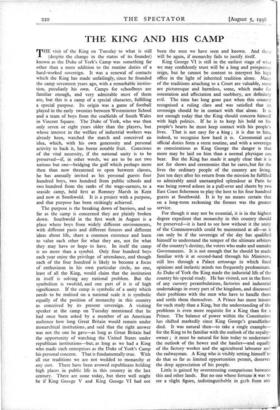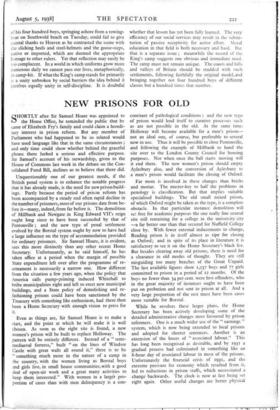THE KING AND HIS CAMP
THE visit of the King on Tuesday to what is still (despite the change in the status of its founder) known as the Duke of York's Camp was something far other than a mere addition to the routine duties of a hard-worked sovereign. It was a renewal of contacts which the King has made unfailingly, since he founded the camp seventeen years ago, with a remarkable institu- tion, peculiarly his own. Camps for schoolboys are familiar enough, and very admirable most of them are, but this is a camp of a special character, fulfilling a special purpose. Its origin was a game of football played in the early twenties between Westminster School and a team of boys from the coalfields of South Wales in Vincent Square. The Duke of York, who was then only seven or eight years older than the players, but whose interest in the welfare of industrial workers was already keen, watched the match and conceived an idea, which, with his own generosity and personal activity to back it, has borne notable fruit. Conscious of the vital necessity, if the national unity is to be preserved—if, in other words, we are to be not two nations but one—bridging the gulf which perhaps more then than now threatened to open between classes, he has annually invited as his personal guests four hundred boys, two hundred from public schools and two hundred from the ranks of the wage-earners, to a seaside camp, held first at Romney Marsh in Kent and now at Southwold. It is a project with a purpose, and that purpose has been strikingly achieved.
The purpose is the breaking down of barriers, and so far as the camp is concerned they are plainly broken down. Southwold in the first week in August is a place where boys from widely different environments, with different pasts and different futures and different ideas about life, share a common existence and learn to value each other for what they are, not for what they may have or hope • to have. In itself the camp is no more than a symbol. Only four hundred boys each year enjoy the privilege of attendance, and though each of the four hundred is likely to become a focus of enthusiasm in his own particular circle, no one, least of all the King, would claim that the institution in itself is solving any national problem. But the symbolism is twofold, and one part of it is of high significance. If the camp is symbolic of a unity which needs to be realised on a national scale it is symbolic equally of the position of monarchy in this country as conceived by its present sovereign. A visiting speaker at the camp on Tuesday mentioned that he had once been asked by a member of an American audience how long Great Britain would remain under monarchical institutions, and said that the right answer was not the one he gave—as long as Great Britain had the opportunity of watching the United States under republican institutions—but, as long as we had a King who made such enterprises as the Duke of York's Camp his personal concern. That is fundamentally true. With all our traditions we are not wedded to monarchy at any cost. There have been avowed republicans holding high places in public life in this country in the last century. There are none today, but there well might be if King George V and King George VI had not been the men we have seen and known. And there will be again, if monarchy fails to justify itself.
King George VI is still in the earliest stage of what we may confidently trust will be a long and prosperous reign, but he cannot be content to interpret his high office in the light of inherited tradition alone. Many of the traditions attaching to a Court are iialuable, some are picturesque and harmless, some, which make for ostentation and affectation and snobbery, are definitely evil. The time has long gone past when this country recognised a ruling class and was satisfied that its sovereign should be in contact with that alone. It is not enough today that the King should concern himself with high politics. If he is to keep his hold on his people's hearts he must keep contact with his people's lives. That is not easy for a king ; it is due, to him, indeed, to recognise how hard it is. Ceremonial and official duties form a stern routine, and with a sovereign as conscientious as King George the danger is that more may be laid on him than a normal physique can bear. But the King has made it amply clear that it is not for shows and ceremonies that he cares, but for : the lives the ordinary people of the country are living. Just ten days after his return from the mission he fulfilled so admirably amid unexampled splendour. at Paris he was being rowed ashore in a pull-over and shorts by two East Coast fishermen to play the host to his four hundred guests at Southwold. It is by no means certain that on a long-term reckoning the former was the greater service.
For though it may not be essential, it is in the: highest degree expedient that monarchy in this country should be preserved—it is hard to see how without it the unity of the Commonwealth could be maintained at all—as it can only be if the sovereign of the day has qualified himself to understand the temper of the ultimate arbiters of the country's destiny, the voters who make and unmake Governments. It is not enough that he should be made familiar with it at second-hand through his Ministers, still less through a Palace entourage in which fixed opinions and inelastic minds too frequently predominate. As Duke of York the King made the industrial life of the country his special study. He has visited, not in the form of any cursory perambulations, factories and industrial undertakings in every part of the kingdom, and discussed their problems with the men who have to handle them and settle them themselves. A Prince has more leisure for such study than a King, but the understanding of the problems is even more requisite for a King than for a Prince. The balance of power within the Constitution has shifted markedly since King George's grandfather died. It was natural then—to take a single example—, for the King to be familiar with the outlook of the royalty- owner ; it must be natural for him today to understand the outlook of the hewer and the haulier—and equally of the factory • worker and the agricultural labourer and the railwayman. A King who is visibly setting himself to do that so far as limited opportunities permit, deserves the deep appreciation of his people.
Little is gained by overstressing comparisons between this and other lands. But no one whose fortune it was to see a slight figure, indistinguishable in garb from any of his four hundred boys, springing ashore from a rowing- boat on Southwold beach on Tuesday, could fail to give mental thanks to Heaven as he contrasted the scene with the clicking heels and steel-helmets and the goose-steps, native or imported, which are deemed the appropriate homage to other rulers. Yet that reflection may easily be too complaCent. In a world in which uniforms grow more numerous daily we cannot pass our lives, metaphorically, in camp-kit. If what the King's camp stands for primarily is a unity unbroken by social barriers the idea behind it involves equally unity in self-discipline. It is doubtful whether that lesson has yet been fully learned. The very efficiency of our social services may result in the substi- tution of passive receptivity for active effort. Moral education in that field is both necessary and hard. But that is a separate issue ; meanwhile the record of the King's camp suggests one obvious and immediate need. The camp must not remain unique. The coasts and hills and valleys of Britain should be studded with such settlements, following faithfully the original model, and bringing together not four hundred boys of different classes but a hundred times that number.



































 Previous page
Previous page